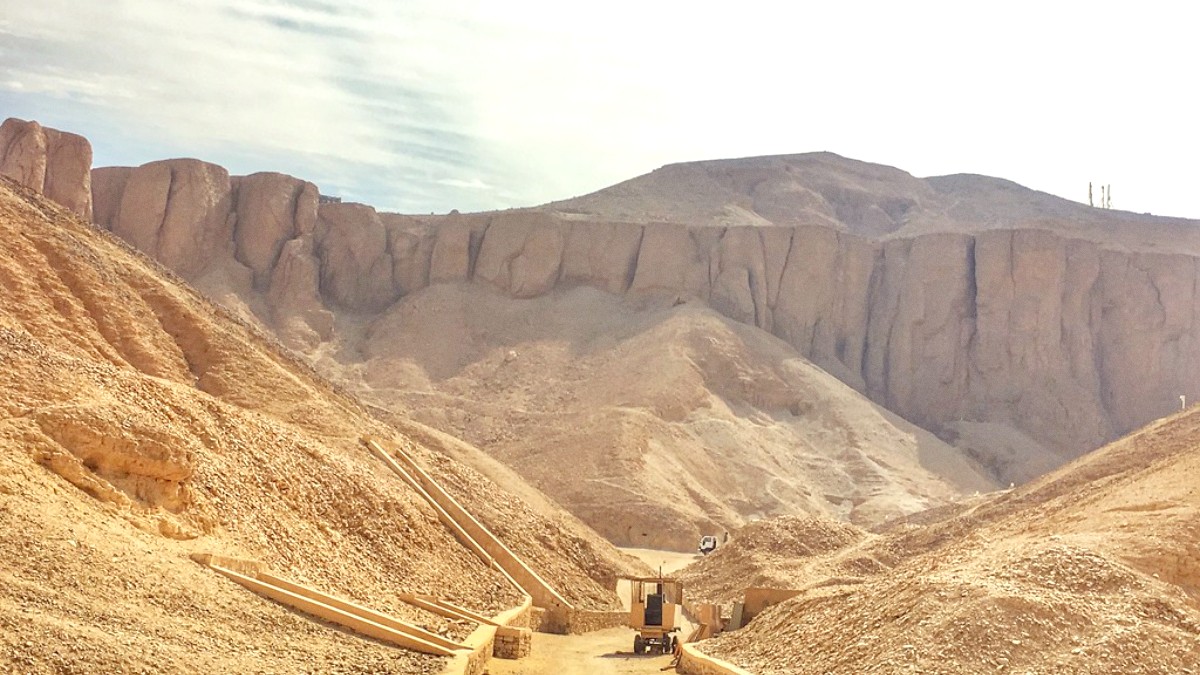
Luxor, Egypt
Egyptian cuisine reflects centuries of history and diverse cultural influences, including Ottoman, Levantine, Mediterranean, and North African traditions.
It emphasizes fresh, seasonal ingredients like legumes, vegetables, rice, and bread. Meat, typically lamb, beef, or chicken, features in many dishes.
Common ingredients include rice, wheat for bread, and legumes like fava beans, lentils, and chickpeas.
Vegetables like onions, garlic, tomatoes, and aubergine feature prominently, seasoned with cumin, coriander, and mint.
Olive oil, sunflower oil, and butter (samna) are common fats. Feta-style cheese (gebna) and yogurt are also consumed.
Stewed fava beans with olive oil, cumin, and lemon. A breakfast staple, found from street carts to buffets.
This national dish presents an authentic taste of daily Egyptian life.
A national dish layering rice, macaroni, lentils, chickpeas, tomato sauce, garlic vinegar, and crispy fried onions.
Seek out specialized Koshary shops for this unique and filling meal.
Hawawshi is an Egyptian meat pie with spiced minced meat baked inside local bread. Kebabs and Kofta are popular grilled lamb or beef options.
These feature hearty and flavorful street food or restaurant choices.
Black tea (Shai), often strong and sweet. Hibiscus tea (Karkadeh) is popular, served hot or cold. Turkish-style coffee (Ahwa) is strong and served in small cups. Sugarcane juice (Aseer Asab) is a local specialty.
Basbousa, a sweet semolina cake soaked in syrup. Konafa, shredded phyllo dough dessert often with cream or nuts. Om Ali, Egyptian bread pudding served warm.
Upscale restaurants found mainly in 5-star hotels on the East Bank. They feature international cuisine alongside Egyptian specialties.
Numerous options exist on the East Bank Corniche and in the city center. They present a mix of local and international dishes.
Abundant on the East Bank, especially in market areas. Seek out places with high turnover for freshness. Small, unpretentious local cafes serve traditional Egyptian food at low prices.
Egyptian cuisine features many naturally vegetarian and vegan dishes like foul, ta'ameya, koshary, and mahshi. Confirm no animal products like butter or broth.
Many traditional dishes are plant-based, offering abundant choices.
Almost all meat in Egypt is Halal. Kosher food is generally unavailable. Gluten-free options present challenges; clear communication of allergies, perhaps with a translated card, is advisable.
Translation apps assist in conveying dietary needs.
Some guesthouses or specialized operators teach Egyptian dishes.
Explore local markets and street food scenes. GetYourGuide.
Many restaurants along the East Bank Corniche offer scenic Nile views.
A private dinner on a felucca during a Nile sunset cruise.
Seek out small, local restaurants for authentic and budget-friendly Egyptian meals.
These provide a true taste of home-style cooking.
The local markets on the East Bank offer fresh produce and prepared foods, including street snacks.
Observe where locals eat for freshness and quality.
Participate in a cooking class to gain a appreciation for Egyptian culinary traditions and methods.
Consider a Felucca dinner on the Nile for an unique atmosphere combined with traditional Egyptian food.
Some guesthouses on the West Bank or specialized tour operators organize Egyptian cooking classes, often focusing on traditional dishes.
Food tours explore local markets and street food scenes, providing insight into local culinary culture.
A private dinner on a felucca during a Nile sunset cruise delivers a romantic experience.
Many desserts and special dishes become notably popular during the holy month of Ramadan and during Eid celebrations.
Experience unique flavors tied to these festive periods.
Enjoy a variety of fresh, seasonal fruits that are readily available in local markets throughout the year.
Mango, guava, and oranges are popular when in season.
Black tea (Shai), often strong and sweet. Hibiscus tea (Karkadeh) is also popular. Turkish-style coffee (Ahwa) is strong and served in small cups.
Sugarcane juice (Aseer Asab) is a local specialty. Fresh mango, guava, and orange juices are available when in season, offering a refreshing choice.
Alcohol is available in licensed hotels, some restaurants, and dedicated liquor stores. Stella and Sakara are local beer brands that one can try.
When in Luxor, try Koshary from a specialized Koshary shop. This national dish presents a flavorful and filling meal that represents good value.